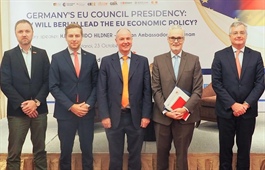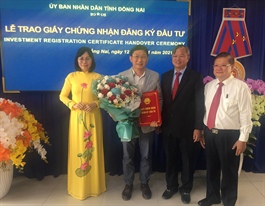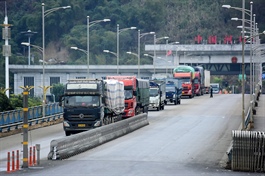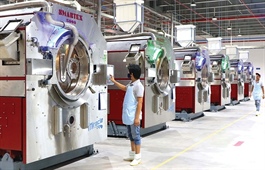Cavalcade of revisions to stimulate business
Cavalcade of revisions to stimulate business
After a 2020 full of drastic changes by the pandemic, and shifts in global supply chains, the Ministry of Planning and Investment’s carefully crafted laws on some business and investment aspects may come at the right time to enable Vietnam’s domestic and foreign-invested enterprises to rebound and grow even stronger.
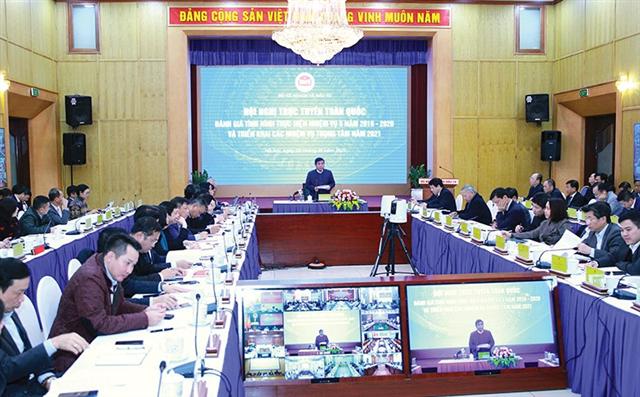
Minister of Planning and Investment Nguyen Chi Dung outlined the ministry’s plans for 2021, Photo: Chi Cuong
|
The Law on Investment and the Law on Enterprises with provisions for public-private partnerships (PPP) are two important laws for Vietnam’s economy, which will be implemented this year.
In the draft decrees guiding the implementation of these laws, the Ministry of Planning and Investment (MPI) addresses the key issues in detail. “We are ready to receive comments from ministries and localities on implementing these laws effectively,” said Minister of Planning and Investment Nguyen Chi Dung at a conference last week.
According to Minister Dung, in the 2016-2020 period the system of institutions, laws, and policies in planning, investment, and statistics was continuously and comprehensively renovated.
The ministry submitted five laws for public investment activities and improvement of the business environment to the government and National Assembly – the amended Law on Public Investment, the amended Law on Investment, the amended Law on Enterprises, the Law on the Support of Small- and Medium-sized Enterprises, and the Law on Public-Private Partnership Investment.
Analysts said the documents drafted under the chair of the MPI show its pioneering role in proactively proposing reforms of the institutional system and policies towards creating a legal corridor for economic restructuring, the renewal of the country’s growth model, and the improvement of the allocation and mobilisation of resources for development investment.
Moreover, the laws will help promote the private economy and drastically innovate and improve Vietnam’s business environment.
The MPI also took the lead in innovating the mode of establishing the new laws by minimising the number of legal documents to facilitate a smoother implementation process for people and businesses.
Ironing out issues
During the last few months, the MPI has presided over the establishment and submission of a series of resolutions on improving the business environment and enhancing national competitiveness; and published several resolutions on business support and development and the simplification of regulations related to companies’ activities in the country.
Le Anh Quan, Vice Chairman of Haiphong People’s Committee confirmed that the new regulations and publications “are exactly what the people and the business community have been waiting for.”
Up to this point, the MPI has submitted a draft decree detailing and guiding implementation of several articles of the new Law on Investment, including on funding promotion and outward investments, and another decree prescribing the procedures for appraisal of projects of national importance as well as investment supervision and evaluation, based on related decrees.
Both documents are finalising the government’s orientation and will be submitted to the prime minister for signing this month.
Le Anh Duong, Chairman of Bac Giang People’s Committee, commented on the decree guiding the examination under the Law on Investment that, “The MPI has worked very quickly on the issues that our locality cares about and solved most of them. However, there remains one point to be clarified by the ministry.”
Clause 3, Article 33 of the new law provides the procedures for accepting an investment policy that requires assessment of the conformity of a project with national, regional, and provincial planning.
The law holds that projects that want a policy to be adopted must follow these plans, but in some cases, those plans are not approved, especially provincial ones.
Thus, while waiting for planning approval, a province may get stuck in the process as there is no legal basis to act on.
Ensuring growth
Bac Giang, one of the bright spots amid the economic recovery of the nation, led Vietnam’s growth with an exemplary rate of 13.2 per cent in 2020.
However, Chairman Duong said “the province is having difficulties” in implementing the tasks in the coming period. Currently, the province lacks the necessary land funds to attract further investment and ensure a continuous economic and social growth at that pace, even though Bac Giang had previously added more than 1,100 hectares of land.
“For example, we are currently hoping for the MPI to submit the approval of the Vietnam-Korea Industrial Park project in 2021 as soon as possible to the prime minister to start with its implementation,” Duong emphasised.
Besides the positive changes that the new law on PPP investment brings with it, updates on the laws on investment and enterprises also offer enticing regulations to suit the new situation of the country after the dramatic movements last year.
Many enterprises have just gone through a difficult time as operations stagnated or even failed entirely during the pandemic.
The new laws and policies, therefore, may be just what they need in order to facilitate the economic transformation of such businesses in the new year.
However, it has been pointed out that several additional decrees and guiding documents may be necessary to fully use the opportunities of the new laws and enable localities and the business community to understand and know how to apply them effectively and in the right direction.
|
Tran Hao Hung - Director, Department of Legislation, MPI To ensure the implementation of the Law on Investment 2020 from the beginning of this month, while the detailed decrees and guiding circulars have not yet been issued, the MPI issued Official Letter No.8909/BKHDT-PC on December 31, providing temporary guidance on the implementation of the law, including regulations on agencies, competences, procedures, and so forth. At the same time, the letter provides guidance on the principles of handling project dossiers received before and after January 1 in accordance with the provisions of Article 77 of the Law on Investment. Thus, from now on, valid dossiers received according to the provisions of the Law on Investment 2014 that have no results yet shall be processed following the provisions of the Law on Investment 2014 and Decree No.118/2015/ND-CP. In addition, valid dossiers received under the provisions of the Law on Investment 2014 and Decree 118 with a deadline after January 1 will be processed by the Business Registration Management Agency, which shall guide investors to submit additional missing papers (if any) and adjust the submitted documents to comply with the provisions of the Law on Investment. Bui Anh Tuan - Director, Business Registration Management Agency, MPI The Law on Enterprises 2020 is enacted with the goal of continuing to create a more favourable and safer business environment for the establishment and operation of enterprises. To ensure that the new provisions of this law quickly come to life, in the process of building the law, the MPI has actively drafted decrees guiding the provisions of the law, including on business registration. As such, Decree No.01/2021/ND-CP, effective from January 4, concretises the reforms of the Law on Enterprises, which overcomes the inadequacies and handling problems from the past. Decree 1 has a great scope and directly affects the entire business community. Therefore, although the prime minister has allowed the formulation of this decree in a shortened manner, the MPI has managed to consult other ministries, branches, and localities, as well as business representatives, before submitting the final version to the government. The reforms of the Law on Enterprises will further facilitate a favourable business climate and the implementation of registration procedures, but also increases the burden on government officials. Therefore, the Business Registration Management Agency requested to provide necessary resources for the office to ensure a successful implementation of their assigned tasks. Nguyen Dang Truong - Director, Public Procurement Agency, MPI To ensure smooth transition to the Law on Public-Private Partnership Investment and the decree guiding its implementation, the law directs ministries, agencies, and localities to stop implementing new build-transfer projects and first handle issues at ongoing ones. It also directs ministries, agencies, and localities to switch to the uniform provisions provided by it in their own selection procedures for public-private partnership (PPP) investors. Moreover, as a vital factor in the viability of PPP contracts, the law clarifies the overall rules on the risk sharing mechanism applicable for these projects, while the accompanying decree provides more detailed guidance. This provides a transparent basis for investors to participate in PPP projects. At the same time, authorities should note that the exact terms of the mechanism are to be spelled out in the PPP project’s investment policy approval, along with the actual resources to be subject to the mechanism. |



